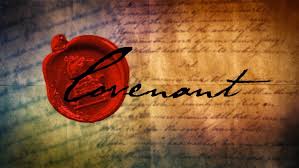Covenants of the TaNaKh

God’s Covenant with Noah (Genesis 9:8-17) is an unconditional divine promise never to destroy all life on the earth with some natural catastrophe; the sign of the covenant is the rainbow in the storm cloud (see the commentary on Genesis, to see link click Da – Never Again Will There Be a Flood to Destroy the Earth).
God’s Covenant with Abraham (Genesis 15:9-21) is an unconditional divine promise to fulfill the grant of land promised to Abram; the Covenant was made on the basis of faith (see the commentary on Genesis Eg – I am the LORD, Who Brought You Out of Ur of the Chaldeans to Give You This Land).
God’s Covenant of Circumcision (Genesis 17:1-27) is a conditional divine pledge to be Abraham’s God and the God of his descendants; the condition was Isra’el’s total dedication to ADONAI as symbolized by circumcision (see the commentary on Genesis En – For Generations to Come Every Male Who is Eight Days Old Must be Circumcised).
God’s Covenant with Moshe (Exodus 19:3-25) is a conditional divine pledge to be Isra’el’s God, protector, the advocate and sustainer of her blessed destiny; the condition was Isra’el’s dedication to HaShem as symbolized by observing the 365 prohibitions and 248 commandments in the Torah (see the commentary on Exodus Dd – The Mosaic Covenant).
God’s Covenant with Phinehas (Numbers 25:10-13) is an unconditional divine promise to maintain the family of Phinehas in a “lasting priesthood;” the implication was that God would forever provide Isra’el with a faithful priesthood.
The Land Covenant (Deuteronomy 30:1-10; Ezeki’el 16:1-63) is an unconditional divine promise that in spite of Israel’s disobedience to the Torah and her subsequent scattering over all the world, she will ultimately be restored to the Land. Isra’el will repent at the end of the Great Tribulation (see the commentary on Revelation Ev – The Basis for the Second Coming of Jesus Christ), the Messiah will return, Isra’el will be regenerated, regathered and possess the Promised Land. The enemies of Isra’el, however, will be judged, and she will experience the promised blessings of the messianic Kingdom.
God’s Covenant with David (Second Samuel 7:5-16; 23:1-5; Psalm 89:30-37; Isaiah 9:6-7, 11:1, 42:6, 54:10; Jeremiah 23:5-6, 30:8-9, 33:14-17, 19-26, Ezekiel 37:24-25; Hosea 3:4-5; Amos 9:11; Luke 1:30-35, 68-70; Acts 15:14-18) is an unconditional divine promise to establish and maintain an eternal dynasty on the throne of Isra’el. Although it is not known who they are, to this day somewhere in the Jewish world members of the house of David still exist. The Messiah will be a descendant of David (First Chronicles 17:11), and David will be given the dual titles of king and prince during the messianic Kingdom (see my commentary on Revelation Fi – The Government of the Messianic Kingdom). Therefore, God promised David four things; an eternal House/Dynasty, an eternal Throne, an eternal Kingdom, and an eternal Descendant.
The New Covenant (Isaiah 55:3, 59:21, 61:8-9; Jeremiah 31:31-34; Ezeki’el 16:60, 34:25-31, 37:26-28; and Romans 11:26-27) is between God and Isra’el (see Eo – The Days are Coming, declares the LORD, When I Will Make a New Covenant with the House of Isra’el and the House of Judah). It is an unconditional, eternal, divine promise to unfaithful Isra’el to forgive her sins and establish God’s relationship with her on a new basis by putting His Torah within them and writing it on their hearts based upon grace.



Leave A Comment